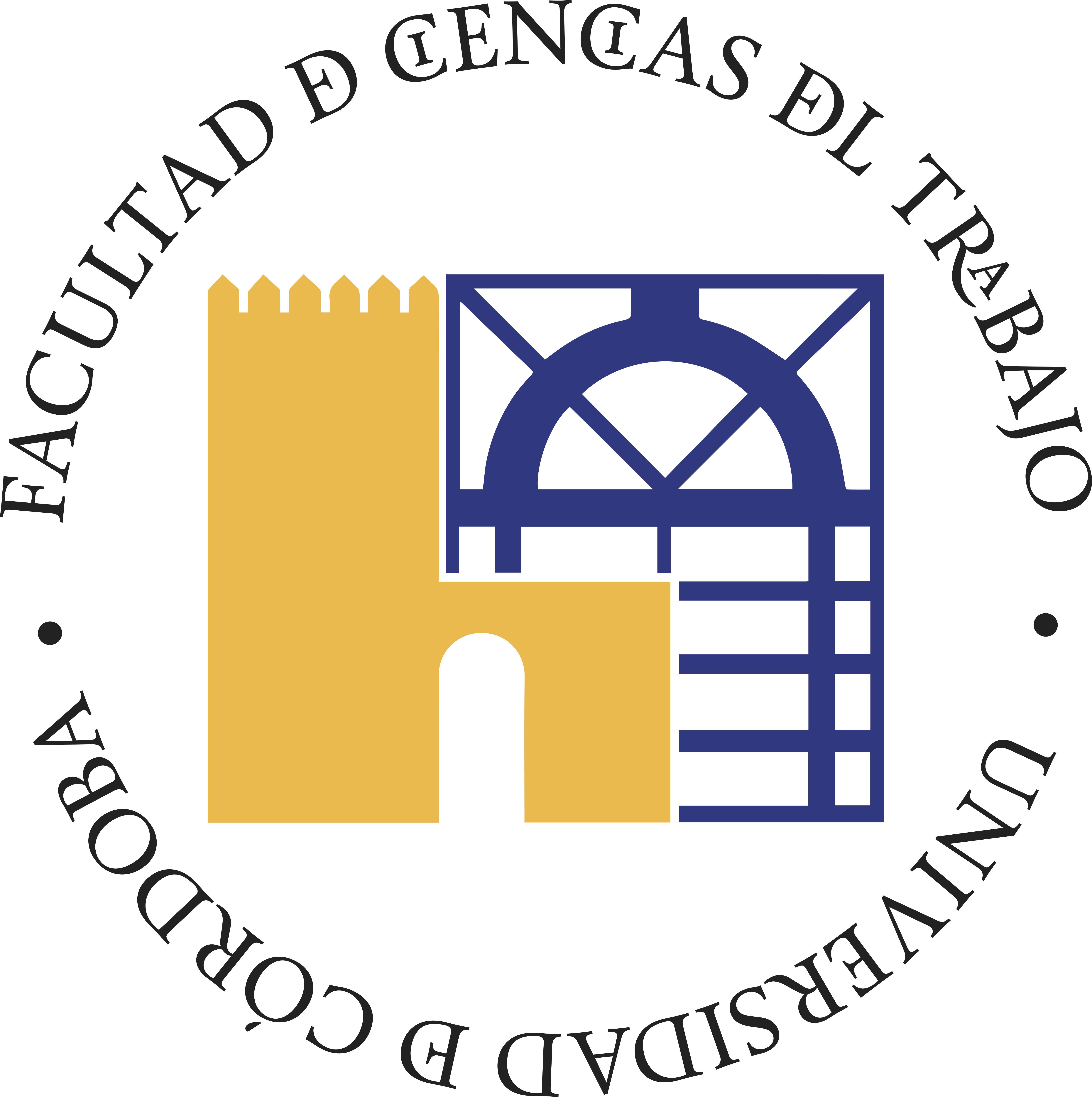General Information
| Degree Name | Bachelor´s Degree in Tourism |
| Number of new student places offered | 90 |
| Minimum number of enrolment credits | 24 credits |
| Faculty and location | Faculty of Labour Sciences |
| Publication in BOE | anuary 29, 2015 / BOE No. 25 / Download |
| Year of title implementation | 2010-2011 |
| Number of courses in the implementation phase | 1st, 2nd, 3rd, and 4th (2013-2014) |
| Field of knowledge | Social and Legal Sciences |
| Program Duration | 240 credits / 4 years |
| Type of teaching | On-site |
| Languages used | Spanish, modern language (English, German/French) |
Degree Justification
The Bachelor's Degree in Tourism has a distinctive and specific professional, academic, and educational profile. Due to its multidimensional nature, the study of tourism has been approached from various scientific perspectives, ranging from spatial planning and economic analysis to business management, service marketing, cultural and psychosocial components, and the legal regulations governing the activity.
The globalization of tourism has led to the emergence of new markets and, consequently, increased competitiveness among destinations. Success in this environment requires offering innovative and high-quality products and services, which demands highly qualified professionals for both public and private management. Therefore, the existence of a Bachelor´s Degree in Tourism is essential for training professionals to work in the following areas:
- Accommodation
- Food and Beverage Services
- Intermediation
- Transport and Logistics
- Public Planning and Destination Management
- Tourism Products and Activities
- Education, Research, and Consulting
Career Opportunities
Academic Opportunities - Links to Other Studies
Graduates in Tourism may access other related studies, including postgraduate and continuing education courses offered by the Faculty of Labour Sciences, as well as other master´s degrees and doctoral programmes at the University of Córdoba.
Professional Opportunities
The degree offers a broad range of professional opportunities:
- Work in the private sector in any of the areas of tourism businesses (accommodation, food services, intermediation, and transport).
- Work in public institutions as a planning or management technician, programme manager for tourism development, tourism development agents, or directors/technicians of institutions promoting tourism products.
- Work in tourism consultancy.
- Work in teaching (secondary or university education).
- Work in research.
Competencies
Basic Competencies
- Analytical and synthesis skills
- Organizational and planning skills
- Oral and written communication in Spanish
- Teamwork
- Interpersonal relationship skills
- Critical thinking
- Autonomous learning
- Ethical commitment to a more just society respectful of fundamental rights
- Acquisition of knowledge and competencies to pursue postgraduate studies
University Competencies
- Proficiency in a foreign language
- Proficiency in ICT tools and skills
- Promotion of active job-seeking habits and entrepreneurial skills
Specific Competencies
- Understand the principles and impacts of tourism: spatial, social, cultural, political, labour, and economic dimensions.
- Understand the dynamic and evolving nature of tourism and leisure society.
- Analyse and understand tourism-generated impacts (social, economic, environmental).
- Know the main political-administrative tourism structures and actors in the sector.
- Understand the legal framework regulating tourism activities.
- Ability to undertake and follow procedures before institutions.
- Select, analyse, manage, interpret, and synthesise information in the tourism sector.
- Know and apply basic concepts of Law, Business Management, Statistics, Economics, and Geography.
- Identify and manage tourist destination spaces.
- Understand objectives, strategies, and tools for tourism planning.
- Understand the functioning of destinations, tourism structures, and business sectors globally.
- Manage various types of tourism entities.
- Plan and manage resources in tourism organisations.
- Define commercial objectives, strategies, and policies in tourism.
- Understand operational procedures in tourism businesses (accommodation, food services, intermediation).
- Evaluate tourism potential and prospective analysis for technical infrastructure and facility planning.
- Manage territories and tourism resources following sustainability principles.
- Understand major initiatives for enhancing cultural heritage.
- Understand characteristics of cultural heritage management.
- Transform an empirical problem into a research object and draw conclusions.
- Work in English as a foreign language.
- Communicate orally and in writing in a second foreign language.
- Work in different cultural environments from a linguistic perspective.
Regulations on Academic Progress (FAQs)
According to the Academic Regulations for Official Undergraduate Studies at the University of Córdoba (approved by the Governing Council on 19/07/2019, modified on 02/07/2020):
Types of enrolment:
- Full-time: New students must enrol in a minimum of 60 and a maximum of 78 ECTS. Continuing students are considered full-time with 37?78 ECTS (more than 78 allowed in exceptional academic cases).
- Part-time: For justified reasons (work, family responsibilities, special needs, residence), students may enrol in 24-36 ECTS for undergraduate and 30?36 for Master?s degrees. Must be requested when registering.
Changing enrolment mode:
- Only allowed at the time of new registration.
- For a change from full- to part-time, students must initially register for at least 37 ECTS and adjust later if approved. Failure to adjust implies withdrawal from the request.
- Changing from part- to full-time only requires notification and takes immediate effect.
Number of attempts per subject:
- Six.
When is an attempt considered used?
- When the student participates in the evaluation process.
What if all 6 attempts are used and the subject is not passed?
- Students may request an extraordinary attempt. The request is resolved by the Dean and reviewed by a Commission composed of university representatives.
Credits required to continue:
- First-year students must pass at least six credits to retain the right to continue. If not, one new enrolment may be granted exceptionally with justification.
Maximum number of years in the degree:
- Degree Programme
- Full-time
- Part-time
- Tourism / Labour Relations & HR
- 7 years
- 10 years
Exceptions apply to students with duly accredited exceptional circumstances.
Advancing an exam call: Students with 15% or fewer credits left to complete the degree may request early exam calls under UCO regulations.
General Information
| Degree Title | Bachelor´s Degree in Labour Relations and Human Resources |
| Number of new enrolment places offered | 120 |
| Minimum number of enrolment credits | 24 credits |
| Faculty and location | Faculty of Labour Sciences |
| Published in BOE | January 29, 2015 / BOE No. 25 / Download |
| Year of title implementation | 2010-2011 |
| Number of courses in the implementation phase | 1st, 2nd, 3rd, and 4th (2013-2014) |
| Knowledge area | Social and Legal Sciences |
| Programme Duration | 240 ECTS credits / 4 years |
| Type of delivery | On-campus |
| Language(s) of instruction | Spanish |
Degree Justification
The Bachelor´s Degree in Labour Relations and Human Resources continues the academic tradition of the former diploma in Labour Relations and the licentiate degree in Labour Sciences, responding to an important societal need. Specifically, the programme addresses the demand for at least the following seven professional profiles:
- Social Graduate
- Human Resources Management and Administration
- Labour market mediation, management and intervention: employment and local development agents
- Occupational risk prevention
- Public Administration
- Socio-labour auditing
- Education
Traditionally, the Social Graduate and Human Resources Management profiles have been well established. However, increasing importance is also being given to roles such as Employment and Local Development Agents, Occupational Risk Prevention specialists, and Socio-labour Auditors.
It is also important to highlight the need and opportunity to strengthen certain professional profiles in new areas related to labour relations, such as public administration and education (especially vocational training for employment). These areas were previously covered by more generic qualifications but now require more specific and comprehensive training.
Career Opportunities
Upon completion of this programme, graduates will have the following academic and professional opportunities:
Academic Opportunities - Links to Other Studies
Alongside other degrees related to business and labour law, this programme provides access to further education. Particularly noteworthy is access to postgraduate and continuing education programmes offered by the Faculty of Labour Sciences, as well as other master?s and doctoral programmes at the University of Córdoba.
Professional Opportunities
The main professional career paths include:
- Social Graduate
- Human Resources Management and Administration
- Labour market mediation, management and intervention
- Occupational Risk Prevention vPublic Administration
- Socio-labour Auditing
- Education
Professional Qualification
Among the career paths, only the role of Social Graduate is regulated. This Bachelor´s Degree qualifies graduates to exercise the profession officially and legally across Spain.
Competencies
- Understand and resolve practical problems related to the legal framework of labour relations and Social Security regulation.
- Ability to manage and lead human resources.
- Acquire specific knowledge of labour sociology and social research techniques.
- Understand work psychology and apply negotiation techniques to labour relations.
- Understand the framework of occupational health and practical aspects of risk prevention.
- Comprehend and interpret economic documents and key labour market data.
- Ability to represent and negotiate within various labour relations contexts.
Basic Competencies
- B1. Analytical and synthesis skills
- B2. Organizational and planning skills
- B3. Oral and written communication in Spanish
- B4. Teamwork
- B5. Interpersonal relationship skills
- B6. Critical thinking
- B7. Autonomous learning
- B8. Ethical commitment to a more just society respectful of fundamental rights
- B9. Competence to undertake postgraduate studies successfully
University Competencies
- U1. Demonstrate command of a foreign language
- U2. Develop and improve digital skills
- U3. Foster proactive job searching and entrepreneurship
Specific Competencies
- Specific Competencies 1 (E1) Solve practical problems within the regulatory framework of labour relations
- Specific Competencies 2 (E2) Understand Social Security regulation and complementary social protection
- Specific Competencies 3 (E3) Design and manage organizations and businesses
- Specific Competencies 4 (E4) Direct and manage human resources
- Specific Competencies 5 (E5) Acquire knowledge in sociology of work and apply social research techniques
- Specific Competencies 6 (E6) Understand work psychology and apply negotiation and conflict resolution techniques
- Specific Competencies 7 (E7) Know the history and dynamics of labour relations
- Specific Competencies 8 (E8) Manage occupational health and safety aspects
- Specific Competencies 9 (E9) Develop critical thinking regarding labour relations theories and systems
- Specific Competencies 10 (E10) Understand economic processes and labour market data
- Specific Competencies 11 (E11) Advise on socio-labour policies
- Specific Competencies 12 (E12) Gain skills in socio-labour auditing
- Specific Competencies 13 (E13) Manage socio-labour information and documentation
- Specific Competencies 14 (E14) Conduct analysis and decision-making in organizational and human resources management
- Specific Competencies15 (E15) Perform representation and negotiation in different labour relations areas
- Specific Competencies 16 (E16) Advise unions and employers' organizations
- Specific Competencies 17 (E17) Provide socio-labour advisory services (employment, contracts, etc.)
- Specific Competencies 18 (E18) Interpret socio-economic data and labour market indicators
- Specific Competencies 19 (E19) Critically analyze decisions from actors in labour relations
- Specific Competencies 20 (E20) Interrelate various disciplines within labour relations
- Specific Competencies 21 (E21) Adapt to the dynamic nature of labour relations
- Specific Competencies 22 (E22) Handle procedures before public or judicial institutions
- Specific Competencies 23 (E23) Identify and apply key legal elements (laws, contracts, responsibilities) in labour relations
Regulations on Enroll
Regulations on Academic Progress (FAQs)
1. What types of enrolment does the University of Córdoba allow?
Full-time: new students must register for at least 60 ECTS and up to 78 ECTS.
Continuing students: 37-78 ECTS (more than 78 possible for exceptional academic performance).
Part-time: for justified reasons (work, family responsibilities, special needs, residence), between 24 and 36 ECTS (for degrees) or 30 to 36 ECTS (for Master?s). Must be requested at enrolment.
2. Can I change my enrolment mode?
Yes, but only when formalising a new enrolment. Switching from full-time to part-time requires registering for at least 37 credits, later adjusted per approval. Switching to full-time is immediate upon request.
3. How many attempts does a student have per subject?
Six attempts.
4. When is an attempt considered used?
Only when the student participates in the evaluation process.
5. What if all six attempts are used and the subject is not passed?
Students may apply for an extraordinary attempt, evaluated by a specific committee, as per the academic regulations.
6. How many credits must a first-year student pass to continue?
At least six ECTS credits. A second enrolment may be requested only once and with justification.
7. How many years can a student remain enrolled in the degree?
Degree Programme Full-time Part-time
Bachelor in Labour Relations and HR / Tourism 7 years 10 years
Exceptions may be granted for duly justified exceptional circumstances.
8. Can exams be brought forward to finish the degree early?
Yes, if the student has 15% or less of credits remaining to graduate.
Qué es
¿Qué es el AULAB y qué pretende?
El AULAB de la Facultad de Ciencias del Trabajo de la Universidad de Córdoba es un espacio de aprendizaje en el que, en colaboración con el Colegio de Graduados Sociales (ICOGS), permite al alumnado del Grado de Relaciones Laborales y Recursos Humanos (RRLL-RRHH) poner en práctica los conocimientos adquiridos a lo largo de la carrera, mediante la gestión y, en su caso resolución de asuntos en los que actúan como profesionales en los distintos ámbitos de la asesoría laboral, estudiando y resolviendo casos reales planteados por clientes (entidades colaboradoras, etc.), bajo la supervisión del profesorado universitario y, en su caso, de los profesionales que colaboren (Graduados Sociales, asesores, juristas y profesionales de los diversos ámbitos).
Igualmente, AULAB pretende ser una herramienta y un espacio de cooperación con el ICOGS que facilite e incentive el desarrollo y la vocación en el ámbito profesional de la asesoría laboral en general y del graduados social en particular.
El AULAB se configura así como una herramienta con una triple vertiente: como espacio de formación, como proyecto de innovación educativa y como unidad de investigación en relación con la metodología de enseñanza clínica (Clinical Legal Education). La idea principal que se pretende llevar a cabo es que el alumnado de RRLL-RRHH pueda tener unas primeras experiencias en el ámbito de la asesoría sociolaboral.
En la metodología clínica se utilizan métodos interactivos para enseñar habilidades y competencias necesarias para la práctica de la asesoría en el mundo del trabajo. De esta forma, los/as estudiantes tienen la oportunidad de trabajar con profesionales (responsables de recursos humanos, graduados sociales, juristas, empresas, etc.) y, al mismo tiempo, sus actividades son supervisadas y guiadas por expertos y docentes dentro de un sistema estructurado y coherente. El aprendizaje con el método clínico es un proceso de aprendizaje de cómo aprender de la experiencia (learning by doing).
Con esta metodología se consigue: por un lado, trabajar las competencias y habilidades que debe tener todo profesional de este sector, enfrentándose a las problemáticas que pueden surgir en el ejercicio profesional y a los problemas de la realidad social; y por otro, lograr unas personas y profesionales más comprometidos socialmente y sensibilizados ante las desigualdades y en la lucha contra la injusticia, es decir, con una mayor conciencia social, desempeñando así la función social que toda Universidad pública debe cumplir.
En suma, el AULAB es un espacio de promoción de la excelencia en la formación del alumnado de RRLL-RRHH, en el cual estudiantes prestan asesoramiento, gratuito y sin ánimo de lucro en colaboración con miembros del Colegio de Graduados Sociales y bajo la supervisión de profesionales y profesorado.
Una Clínica Legal algo singular y especializada.
El AULAB nació como Proyecto de Innovación Docente y pretende fortalecer el itinerario profesional de la Asesoría jurídico-laboral, fortaleciendo especialmente la vocación de graduado social entre el alumnado de RRLL-RRHH. Con dicha finalidad, cuenta con la estrecha colaboración de Colegio de Graduados Sociales de Córdoba (ICOGS-Córdoba), cuyos miembros participan activamente en su desarrollo. Junto a ello, este Laboratorio que pretende servir de espacio para el asesoramiento a ONG, entidades sin ánimo de lucro y personas sin recursos económicos o en riesgo de exclusión social.
El modelo de formación seguido en el AULAB conecta la realidad jurídica y de gestión con la enseñanza de las materias vinculadas a la asesoría laboral (Derecho del Trabajo, Seguridad Social, Derecho Fiscal y Tributario, contabilidad, etc.), ofreciendo al estudiante la posibilidad de conocer casos reales y actuar sobre ellos. El seguimiento y desarrollo de los asuntos seguirán todos los ámbitos de este perfil profesional: desde la gestión y elaboración de documentación, a la tramitación y actuación ante las instituciones, incluida la (simulación) de intervención-defensa ante la jurisdicción social.
Por esta razón, en el seno del AULAB existe dos Clínicas laborales, interconectadas, pero con profesorado especializado en cada una: por un lado, la jurídico-social (Derecho del Trabajo y de la Seguridad Social, Derecho Financiero y Tributario y Administrativo) y por otro, la económico-empresarial (Contabilidad, Recursos Humanos, auditoría), al frente de cada una de ellas habrá un profesor/a (Coordinación de Clínica).
Misión
Acercar al alumnado a la actividad profesional de la ASESORÍA LABORAL
- Mediante seguimiento de asuntos reales
- Gestión y elaboración de documentación
- Orientación en tramitación, actuación ante instituciones e intervención-defensa en juicio (simulada)
- Resolución: informe-dictamen, instancia, demanda, etc.
- Con acompañamiento y supervisión de profesionales y profesorado UCO.
Objetivos
- Aprender de forma práctica en entornos similares a la realidad
- Interdisciplinariedad
- Incentivar el perfil profesional de asesoría laboral (GS)
- Conexión Universidad-Empresa/Profesional
- Compromiso Universidad con la sociedad y con los ODS




